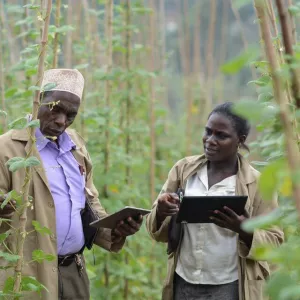New climate data toolkit for agroecology developed with African Institute for Mathematical Sciences, backed by McKnight Foundation
The Alliance of Bioversity International and CIAT is developing a new climate data toolkit with the African Institute for Mathematical Sciences (AIMS), with support from the McKnight Foundation (a Minnesota-based family foundation that prioritizes investments in global collaboration for resilient food systems), that will enable researchers to analyze climate risks to better understand how farming systems respond to stress and shocks,

New climate data toolkit for agroecology developed with African Institute for Mathematical Sciences, backed by McKnight Foundation
The Alliance of Bioversity International and CIAT is developing a new climate data toolkit with the African Institute for Mathematical Sciences (AIMS), with support from the McKnight Foundation (a Minnesota-based family foundation that prioritizes investments in global collaboration for resilient food systems), that will enable researchers to analyze climate risks to better understand how farming systems respond to stress and shocks, focusing on agroecological practices.
Farmers worldwide are at the frontlines of climate change, facing erratic rainfall, prolonged droughts, and increasingly unpredictable seasons. Agroecology is the practice of applying ecological and social concepts and principles to the design and management of sustainable agriculture and food systems. According to the Food and Agriculture Organization of the United Nations (FAO), it is an approach that seeks to optimize interactions between plants, animals, humans and the environment while also addressing the need for socially equitable food systems, where people can exercise choice over what they eat and how and where it is produced.
While agroecological practices hold promise in building resilience, researchers and policymakers struggle with the critical question of how to quantify the agroecological impacts, leading the McKnight Foundation to support this ambitious project to enhance the integration of climate data into agroecological research. The project will equip researchers and practitioners with robust, user-friendly tools to assess how agroecological systems respond to climate related stresses and shocks, ultimately strengthening the evidence base for climate adaptation.
The implications stretch far beyond agroecology. By embedding climate data into agricultural research, the project will help inform better policies, refine adaptation strategies, and support farmers in making data-informed decisions that enhance their resilience.
Agroecological practices have the potential to enhance biodiversity and resilience in farming systems, but researchers and policymakers often struggle to quantify their climate adaptation benefits. This project aims to bridge that gap by developing a climate data toolkit.

